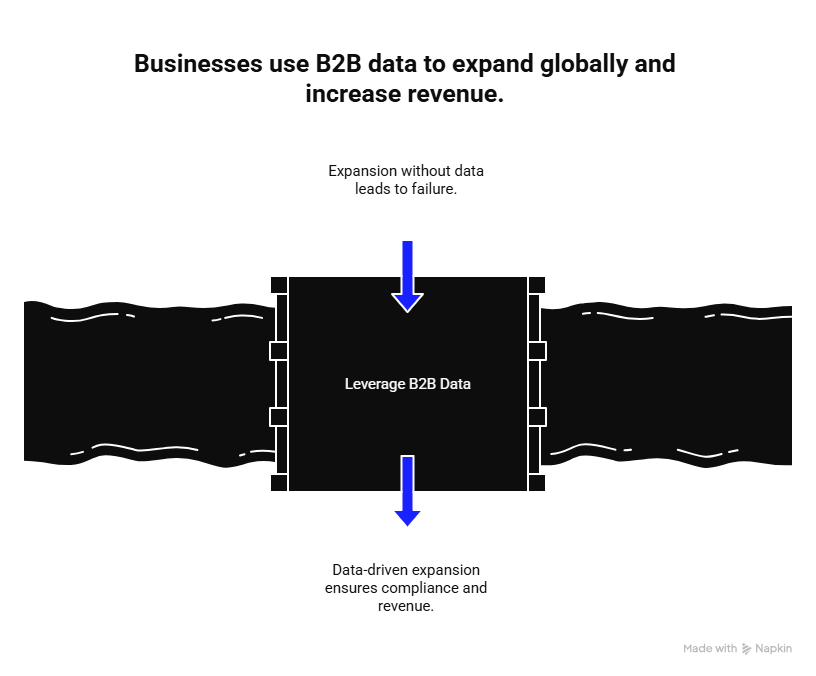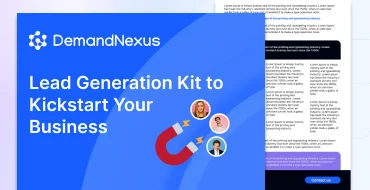Scaling your business into new markets is a powerful way to drive growth, but international business expansion comes with unique challenges. For B2B companies, success hinges on a data-driven business strategy, localized marketing, and a deep understanding of cross-border dynamics. Whether you’re entering the B2B ecommerce space or expanding your B2B sales, this guide offers actionable insights to navigate the complexities of global markets in 2025. From leveraging data to optimizing SEO, we’ll explore how to build a winning B2B marketing strategy for sustainable growth.
Why Pursue International Business Expansion?
Expanding globally unlocks new revenue streams, diversifies your customer base, and strengthens your competitive edge. For B2B companies, the commerce market is ripe with opportunities, with the global B2B ecommerce market size projected to reach $36 trillion by 2026, according to Statista. Key benefits include:
- Access to untapped markets with high demand for your solutions.
- Reduced reliance on saturated domestic markets.
- Enhanced brand credibility through a global presence.
- Opportunities to innovate products for diverse customer needs.
However, success requires careful planning to overcome cultural, regulatory, and operational hurdles.

Key Challenges of International Business Expansion
Entering new markets isn’t a simple copy-paste of your domestic business strategy. Here are the top challenges B2B companies face:
| Challenge |
Description |
| Market Complexity |
Different regions have unique buyer behaviors and market dynamics. |
| Regulatory Compliance |
Navigating GDPR, CCPA, and local tax laws is critical to avoid penalties. |
| Cultural Nuances |
Language, communication styles, and preferences vary widely. |
| Sales and Marketing Alignment |
Localized campaigns require precise targeting and coordination. |
These hurdles underscore the need for high-quality
data to inform every step of your expansion.
8 Proven Strategies for Successful International Expansion
To thrive in global markets, B2B companies must adopt a strategic approach. Here are eight steps to build a scalable business strategy for 2025:
1. Conduct Thorough Market Research
Start by analyzing market potential using data-driven insights to identify high-opportunity regions.
- Assess market size, growth trends, and competition.
- Interview local ICPs to understand pain points and preferences.
- Use tools like Cognism for B2B lead generation data.
2. Calculate Your Total Addressable Market (TAM)
Quantify your TAM to set realistic growth targets and allocate resources effectively.
- Combine bottom-up (firmographic data) and top-down (industry reports) analyses.
- Segment TAM by industry, company size, and geography.
- Leverage data platforms to refine your ICP.
3. Perform Competitive Analysis
Understand your competitors to carve out a unique position in the commerce market.
- Analyze pricing, features, and marketing strategies.
- Identify gaps your solution can fill.
- Study competitor content to validate market pain points.
4. Develop a Localized B2B Marketing Strategy
Tailor your B2B marketing strategy to resonate with local buyers, avoiding one-size-fits-all approaches.
- Create region-specific content in local languages.
- Optimize SEO for local search terms.
- Use platforms like LinkedIn for targeted cross-border campaigns.
5. Ensure Regulatory Compliance
Adhere to local laws to protect your brand and avoid costly fines.
- Verify data providers comply with GDPR and CCPA.
- Understand corporate tax rates and employment laws.
- Consult legal experts for region-specific guidance.
6. Hire Local Talent
Local expertise is crucial for navigating cultural and market nuances.
- Partner with universities or recruiters for entry-level talent.
- Hire experienced leaders with regional sales knowledge.
- Understand local employment laws, like notice periods.
7. Build Strategic Partnerships
Collaborate with local partners to gain credibility and market insights.
- Identify non-competitive partners targeting your ICP.
- Co-host events like webinars to boost brand awareness.
- Use data to find potential distributors or collaborators.
8. Test and Validate Market Fit
Launch small-scale campaigns to test your assumptions before full commitment.
- Run targeted outbound campaigns to gauge engagement.
- Measure ad performance on local platforms.
- Start with a minimal presence to refine your approach.
Case Study: How DemandNexus Fueled a SaaS Company’s Global Expansion
Client: A SaaS provider offering supply chain management software.
Challenge: The client aimed to enter the European B2B ecommerce market but lacked local data and a tailored B2B marketing strategy.
Solution: DemandNexus conducted in-depth market research, calculated TAM, and built a compliant prospect list using GDPR-compliant data. We optimized their SEO for European search terms and launched localized LinkedIn campaigns, supported by a
go-to-market strategy with regional partners.
Results:
- Generated 200+ SQLs in three months, driving a 25% pipeline increase.
- Achieved 30% higher engagement with localized content.
- Closed $1.5M in new revenue within six months.
DemandNexus’s data-driven approach empowered this client to conquer Europe. Ready to expand globally? Contact DemandNexus for expert
B2B demand generation solutions.
Key Metrics to Measure Expansion Success
Track these metrics to ensure your
international business expansion delivers ROI:
| Metric |
Why It Matters |
| Pipeline Growth |
Measures new opportunities in the target market. |
| Cost per Lead (CPL) |
Evaluates efficiency of marketing spend. |
| Engagement Rates |
Reflects resonance of localized campaigns. |
| Revenue Contribution |
Tracks financial impact of expansion. |
Tools to Support International Expansion
These tools streamline your global business strategy:
- Cognism: Provides GDPR-compliant B2B sales data for lead generation.
- Google Analytics: Tracks local SEO performance and website engagement.
- LinkedIn Ads: Targets decision-makers in new markets.
- HubSpot: Manages cross-border campaigns and CRM data.
Final Thoughts
International business expansion offers immense potential for B2B companies, but success demands a strategic, data-driven approach. By researching markets, localizing your B2B marketing strategy, and leveraging high-quality data, you can navigate the complexities of cross-border growth and thrive in the global commerce market. With the right tools and partnerships, your business can unlock new opportunities and drive sustainable revenue in 2025.
Need help scaling globally? DemandNexus specializes in crafting tailored B2B sales and marketing strategies to fuel your expansion. Contact us today to conquer new markets with confidence.





